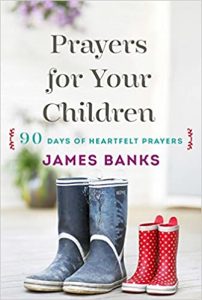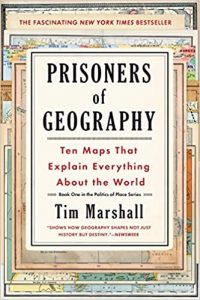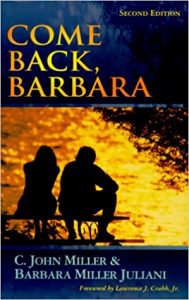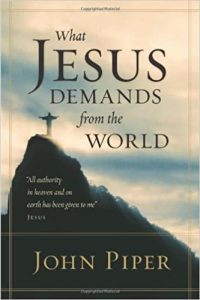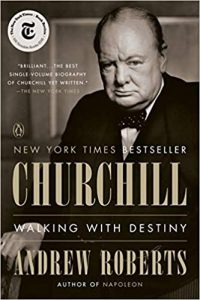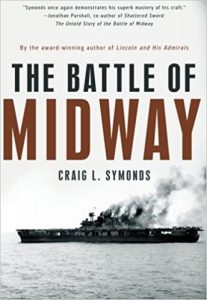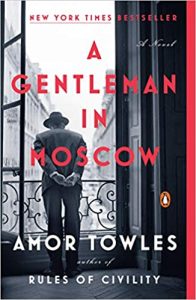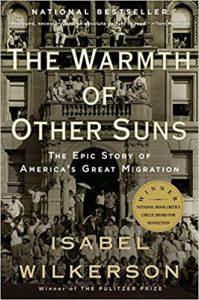Will quarantine continue throughout the summer? We certainly hope not. But we’ve learned enough by now to stop speculating. Perhaps this summer you’ll be stuck in your home. Perhaps you’ll finally emerge and get the chance to have a much-needed vacation.
Whatever your situation, we know that it’s always important to have a good book—or five—on your shelf. So I asked Pastor J.D. for some of the most memorable books he’s read in the past year. I’ll be picking up many of these myself (first up—The Warmth of Other Suns), and we hope you’ll find some good recommendations here as well.
A couple of notes before you dive in:
1. We haven’t arranged these in our order of preference but alphabetically by author.
2. We don’t agree with everything in each of these books. On many points, they even disagree with one another! But we have a philosophy of reading: “Eat the fish, spit out the bones.” These books were on the meatier side. As Pastor J.D. put it, “I consider a good book one that brings up ideas I’ll think about for years to come. I expect each one of these books will do that.”
Go forth and read!
—Chris Pappalardo, Editor
Prayers for Your Children: 90 Days of Heartfelt Prayers, James Banks
James Banks is a local Durham pastor and a treasure of the Triangle that some of you will not have heard of. All of his books on parenting and prayer are fantastic. I (J.D.) have been through his 90-day journey of prayer for your kids three times now. He takes Scripture and shows you how to apply them for your kids. It’ll not only change the way you pray for them but also the way you talk to them and parent them. Having two children who walked away from the faith, one of which has come back, Banks writes with passion, insight, and a deep level of encouragement.
Accidental Presidents: Eight Men Who Changed America, Jared Cohen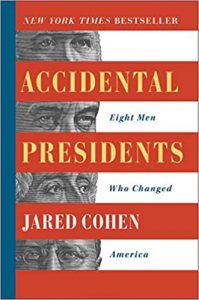
This was a fascinating look at eight leaders who were thrust into one of the most important leadership roles in the world without planning for it. The insights, parallels, and contrasts are fascinating. For whatever it’s worth, I passed this book on to Mark Dever and he said it was one of the best presidential books he’d ever read—and reading presidential books is a hobby of his!
How to Reach the West Again: Six Essential Elements of a Missionary Encounter, Tim Keller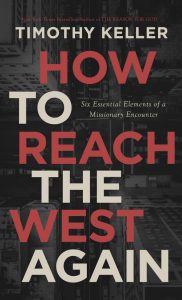
I’m personally committed to reading everything that Tim Keller puts out, and this short book may be one of his most helpful. Again, another big statement, but it is an encapsulation of his missionary approach to the culture we live in. Building on the insights of Leslie Newbigin, he shows us how, unlike in previous generations, we have to enculturate the gospel for hearers today in order for them to understand it, feel its impact, and see the hope that it alone can offer.
Prisoners of Geography: Ten Maps That Explain Everything About the World, Tim Marshall
This was another book that caught me by surprise. Marshall explains how the character of every nation is formed in a profound way by its physical geography. The chapter on America blew my mind with how much the separation of the oceans, docile neighbors, and the vast expanse have shaped who we are as a people. Going region-by-region around the world makes you realize that, with so many other things, who we become is shaped by things we have no control over. He shows you where the independent American streak comes from, why it is very unlikely that America will ever truly be conquered, and, in a very back-door kind of way, he makes one of the best arguments for the Second Amendment I’ve ever heard.
Confronting Christianity: 12 Hard Questions for the World’s Largest Religion, Rebecca McLaughlin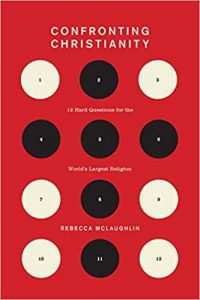
Confronting Christianity would be neck-and-neck with Wesley on the Christian Life (see below) for my best book of the year. It’s hard for me to understate how much I loved this book by Rebecca McLaughlin. She writes with the insight of Keller but the prose and passion of Joni Erickson Tada. I know that’s high praise, but I think this book lives up to it. She captures the essence of contemporary apologetic questions and answers them with grace, clarity, and winsomeness. I’m excited to see more from McLaughlin.
Come Back, Barbara, Jack Miller and Barbara Miller Juliani
This was another book that did soul surgery on me. Regardless of what is happening in the lives of your children, seeing how good parenting doesn’t always lead to kids that make wise decisions is a good exercise for us all. Jack Miller is one of the godliest saints in the contemporary church of our entire generation. Sadly, most Baptists don’t know about him. He’s a man of extreme godliness who had a daughter who walked away, and through that, God taught him that he was the primary prodigal that he was pursuing. It’s an amazing book.
Waiting on God, Andrew Murray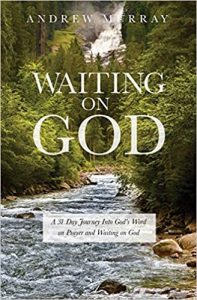
This book probably ministered to me personally more than any book I’ve read in the last five years. Again, I know that’s high praise, but it’s really true. Andrew Murray unpacks the theme of waiting on God through 31 days of devotion and prayer. They’re not light reading—I had to go through the book three times before I really felt like I’d soaked up the things I needed from it—but I will never look at seemingly-unanswered prayer, trial, or my general approach to God in the same way. This book did pretty radical surgery on my soul. It changed how I worship and how I encourage others to approach the heavenly Father.
What Jesus Demands From the World, John Piper
This an oldie-but-goodie, but it totally wrecked me again last summer. Just moving through the statements of Jesus made me realize how revolutionary the call to discipleship actually is. It’s said that Jonathan Edwards read through one of the gospels every morning. I can’t say that’s true of me right now, but I think spending continued time in the life and words of Jesus on a regular basis is something absolutely necessary for every Christian, and this book is a great tool to do that.
Churchill: Walking With Destiny, Andrew Roberts
This book was recommended to me by Al Mohler as the best single-volume biography of Churchill available. Warning: it is a beast, but it is worth the read. I’m fascinated by this time period in history anyway, but seeing how the outcome of WWII, and in many ways the trajectory of the modern world, was set by this extraordinary leader was a fascinating read. It’s dense, but it reads quickly, and Roberts doesn’t get involved in some of the tedious details that other biographies get trapped in. He pauses from time to time to give you real character insights. It’s been a great read. I affirm Mohler’s praise of it.
Wesley on the Christian Life, Fred Sanders
This may be the best book I’ve read in the last 12 months. Fred Sanders’ grasp of both the
theology and methodology of John Wesley and its applicability to contemporary church conversations is amazing, showing how Wesley used 1 John as his anchor book (versus Romans for Luther) and shows how he preached the themes that sparked the Great Awakening. It really was a fascinating book, and I found my ministry immediately impacted by it. That, and I can’t wait to preach through 1 John again.
The Battle of Midway, Craig L. Symonds
For those of you who are into WWII battles, this is one of the most fascinating battles ever to take place in world history. The amount of strategy, bravery, and sheer chance are staggering, and this book is well-written. It became a real page-turner for me.
A Gentlemen in Moscow, Amor Towles
If you have any affinity for Russian literature, this is a must-read. It reads like a Russian novel, about a man who was very into Russian novels. You don’t have to know a lot about Russian literature to really appreciate it. It’s not a fast-paced book, but as with Dostoyevsky, there are nuggets of profound wisdom that arise out of a very normal, day-to-day life narrative.
The Warmth of Other Suns, Isabel Wilkerson
I’ve seen The Warmth of Other Suns recommended by a lot of people. It’s an absolutely fascinating look at the great migration of African Americans in the South to other parts of the country. It traces the story of three individuals and helps you see the damage of the Jim Crow era from a personal level. It helped set some of the contemporary discussions on racial struggle in their historical context. It will break your heart, and particularly for those of us from the majority culture, it’ll help us understand some of the pain that our brothers and sisters of color bring into these discussions.
